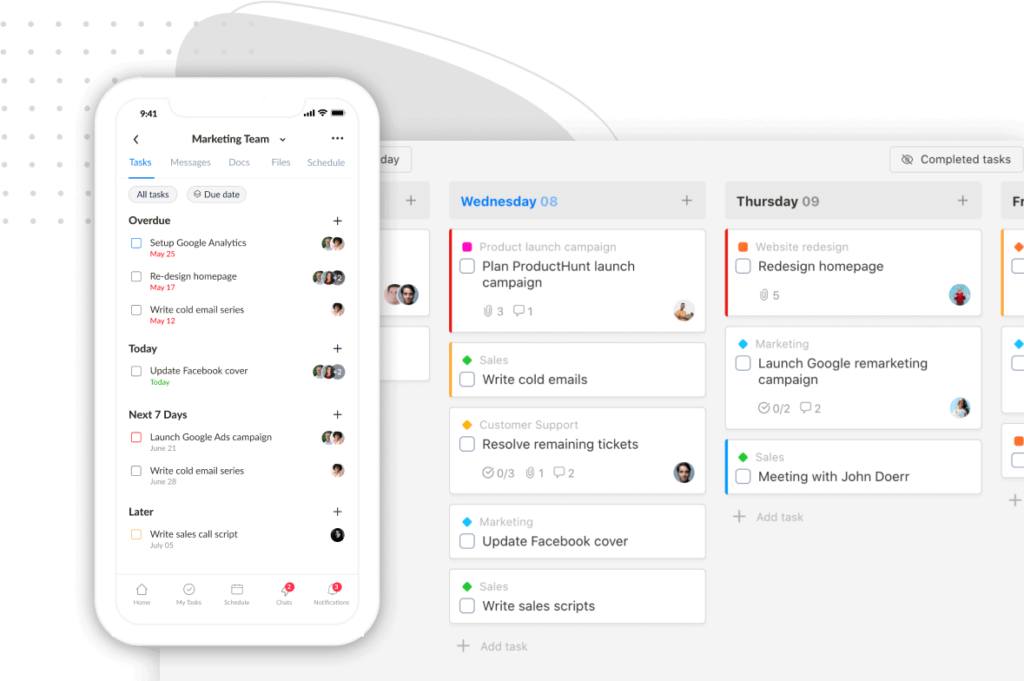People tend to use famous brands.
In the case of Evernote, this phenomenon is all too familiar.
A note taker with 15+ years on the market, like Evernote, is enough to make one think, “it must be good to last that long.”
But how good is the actual product really?
Well, some research and hours of real-life testing on Evernote’s free version says not so good.
Whether you’re considering upgrading to its paid plan or are an Evernote user getting into trouble with it, today, let’s walk through:
- Why look for an Evernote alternative?
- 15 Best Evernote alternatives in 2025
- Reviews, core features, pros and cons, and pricing of each alternative
Okay, let’s get started!
Why Look For An Evernote Alternative?
1. Limited task management capabilities
One thing is clear, Evernote presents itself as a powerful tool for taking notes and task management.
However, there are very few task management features you can use in Evernote’s free version. Nothing but just very basic checklists.
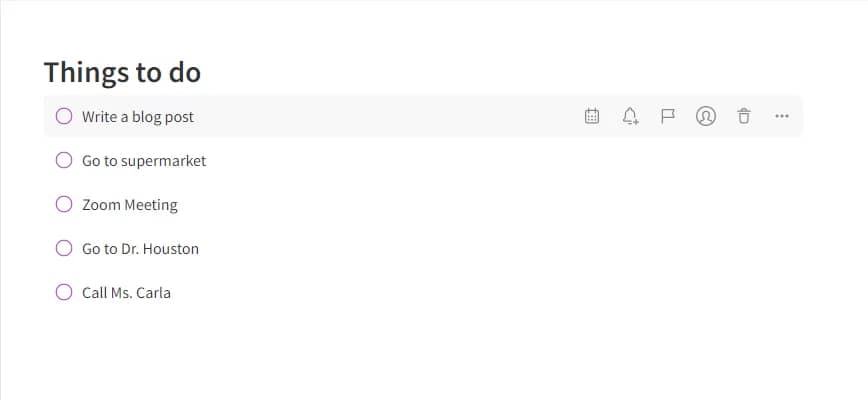
You’ll have to upgrade your Evernote account if you want to use advanced features like set due dates, recurrence, reminders, flag, or assign tasks. The cost ranges from $7.99 to $14.99 per user per month.
But you know what, even if you spend that much, your task management experience on this platform doesn’t get much better.
Evernote has no features for managing workload. No way to track progress. And you cannot check task statuses.
2. No real-time collaboration
We all know that real-time note collaboration is helpful for everyone, no matter that’s teams working on multiple projects, groups of students who are preparing for the upcoming presentation, or couples/families making grocery lists.
It saves you time in so many different ways.
Unfortunately, Evernote doesn’t have that capability.
3. No internal calendar
And yep, Evernote has no in-house calendar, either.
4. Limited monthly note storage
By now, Evernote’s free plan allows users to upload up to 60 MB of docs per month – too little to take audio notes, attach videos, or insert images.
15 Best Evernote Alternatives For Note-Taking in 2025
1. Upbase
Platforms: iOS, Android, and web.
If you think Evernote is too limited a tool for your use case, Upbase might be what you’re seeking.
Upbase is an all-in-one work management platform with note-taking capabilities, a task management function, and various collaboration tools. It’s specifically designed to keep teams working seamlessly in one place, hence, to be more productive.
But the simplicity of Upbase’s clean and minimal user interface–and its simplicity as a whole–is the platform’s primary highlight.
Many recent reviewers have pointed out that Evernote’s getting bloated. Upbase was designed with this in mind from the outset. So, it’s friendly for new users with different technical experiences.
Upbase defeats Evernote when it comes to task management capabilities. Unlike Evernote, Upbase offers many features for free and is extremely suitable for small teams and businesses.
Let’s dive into Upbase’s best features and discover why it’s one of the best Evernote alternatives.
Unique features
A. Simple and speedy UI
To strike the balance between simplicity and functionality, Upbase discards many frills, inserts dropdown menus reasonably, and makes an organized hierarchy structure.
While Evernote uses notebooks to organize notes, Upbase uses folders and up to 5 levels of subfolders. And this difference changes the game.
Imagine when your notes get cumulative in the app over time, an app’s organized hierarchy structure will save you time searching and keep you focused on work with minimum distraction.
Upbase’s drag-and-drop UI is another feature you can’t find in Evernote, which makes your note-organizing experience frictionless and convenient.
B. Docs
As mentioned, Upbase is an all-in-one PM tool. It uses lists to manage projects, teams, or departments depending on specific needs.
Each Upbase’s list provides 6 tools; Docs is one of them, intended for taking notes and document management. In Docs, you can:
- Create unlimited documents
- Edit content. Insert links.
- Organize docs in folders and subfolders. Drag and drop to reorder them within a folder/subfolder or between folders/subfolders.
- Embed Google Docs, Sheets, and Slides. Drag and drop to organize them.
- Copy link
Things that you can do in Upbase’s Docs, but not in Evernote:
- Add watchers
- Share a public link
- Add comments, send emojis, tag other members, and interact with comments

Bonus: The comment section can slide in and out to keep the interface clean and intuitive.
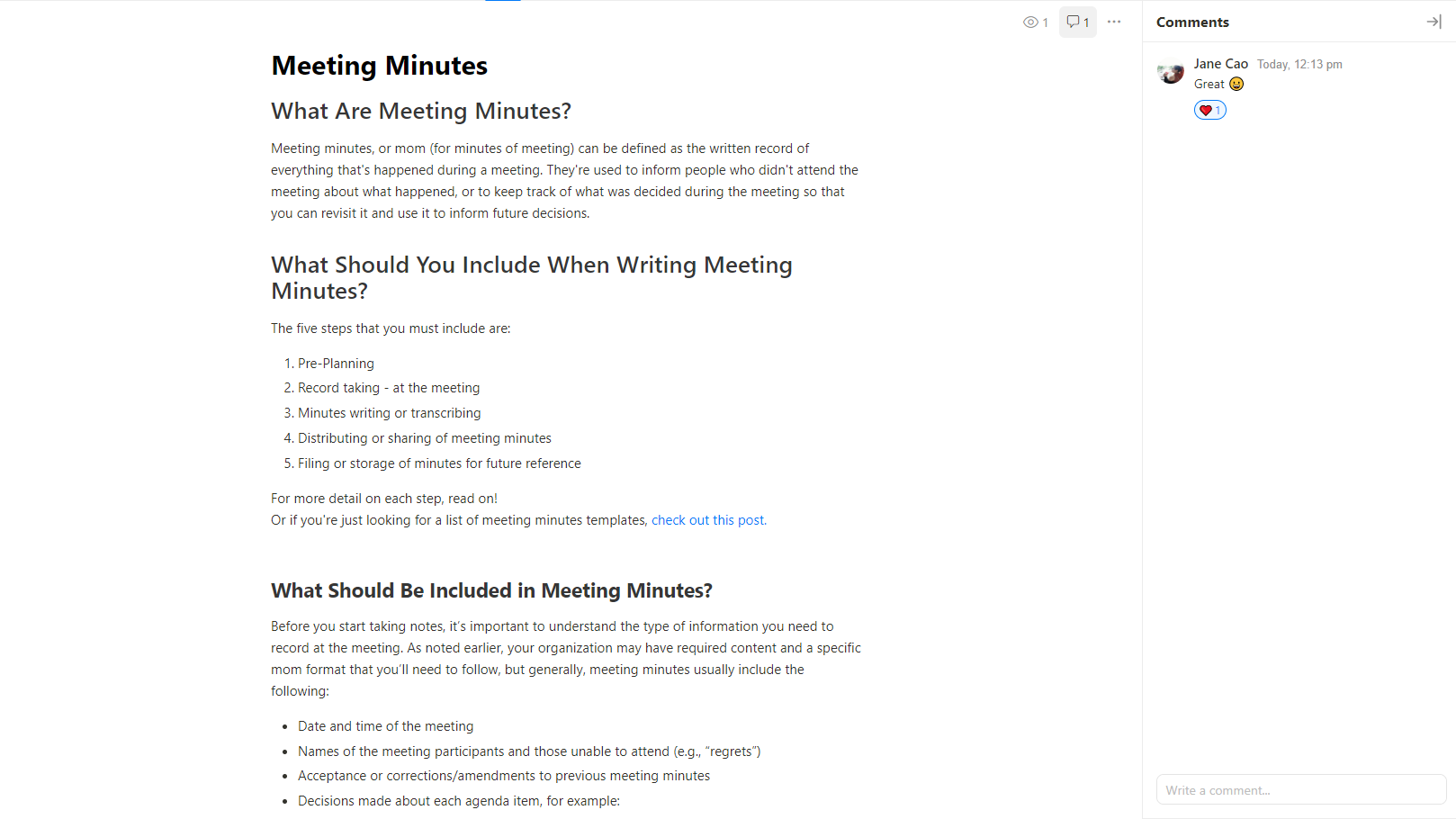
C. Files
Upbase’s Files is a specific tool intended for file storing, managing, and collaborating within a list. Here, you can:
- Drop or select files to upload. Embed Google Drive Folder
- Organize files by folders and subfolders
- Move files to another folder/subfolder
- Upload new versions. Version history.
- Copy the internal link. Share a public link.
- Add watchers, comments, @mention, send emojis, react to a comment in a file
- Present files and folders in the Grid or List view
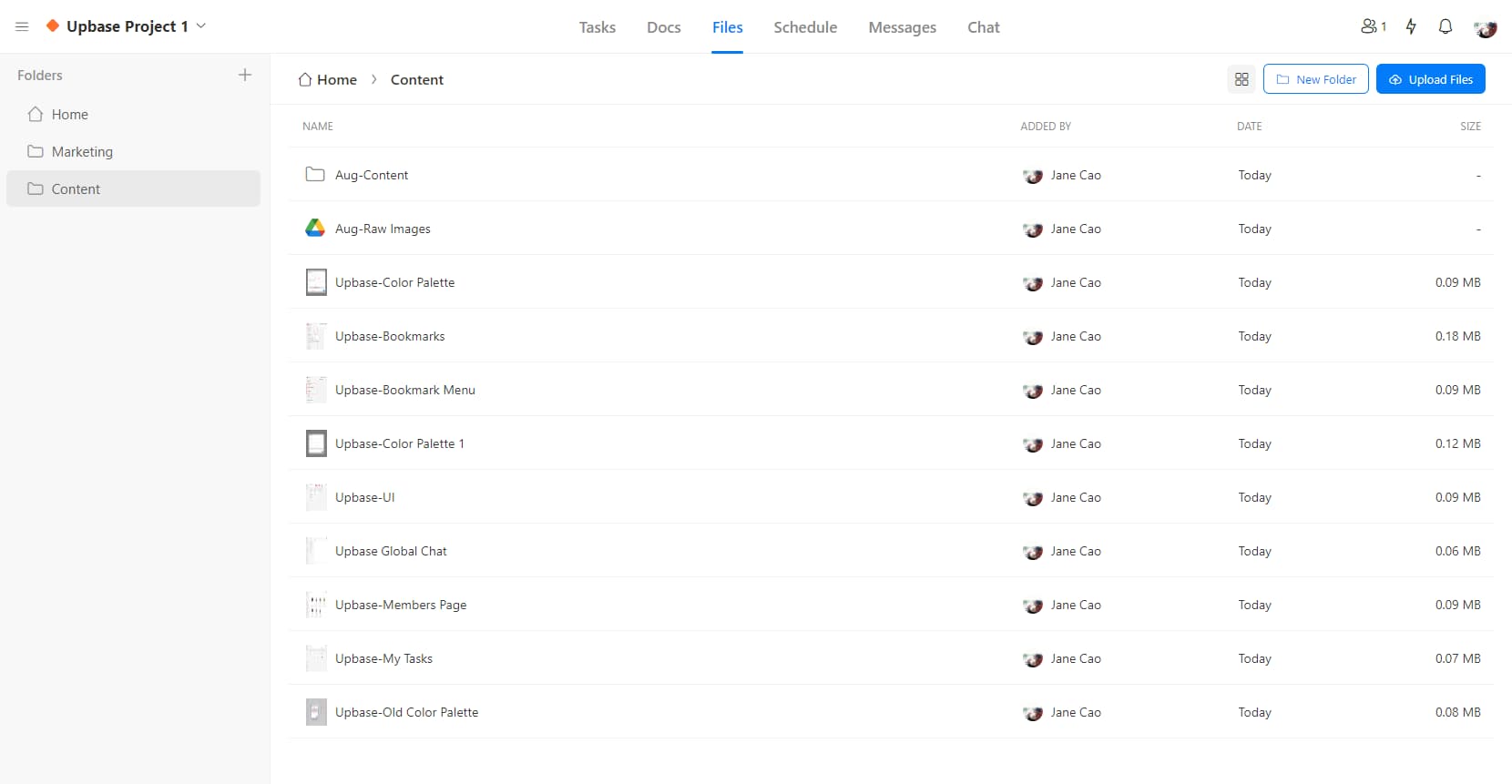
Upbase’s Files-List View
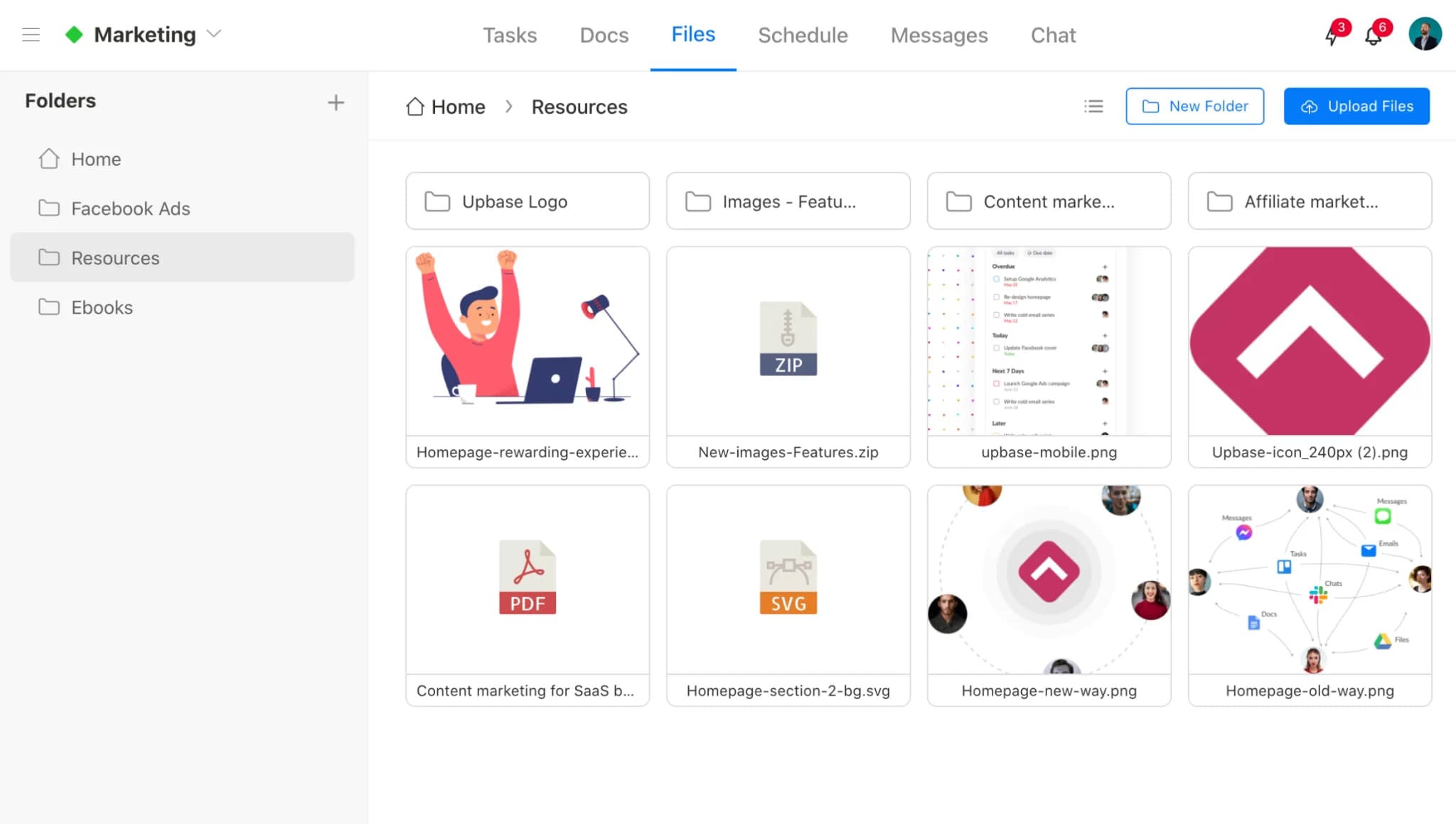
Upbase’s Files-Grid View
D. Bookmarks
While Evernote enables users to ping their frequently-used notes to Shortcuts, Upbase has Bookmarks.
Although these two features are different in their names, they work similarly.
Bookmarks’ unique features include:
- Bookmark an external link
- Rename bookmarks
- Customize the bookmark’s icon and color
- Drag and drop a bookmark within a folder/in and out of a folder
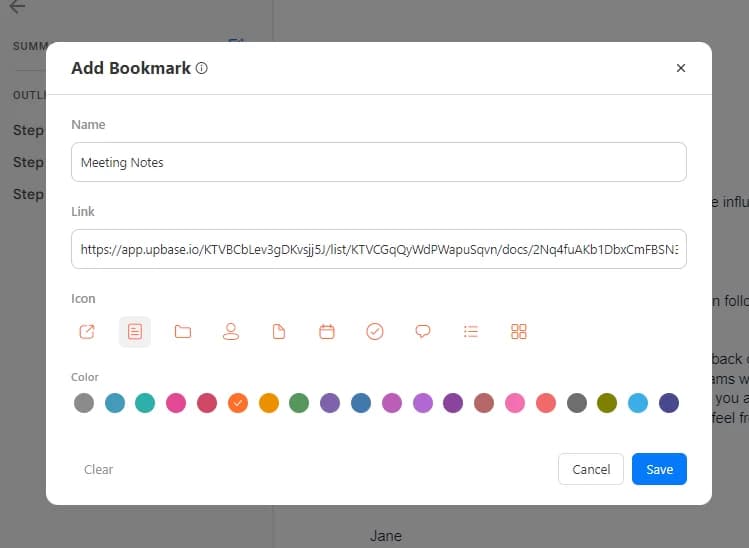
All the bookmarks can be shown/hidden in the left menu of the screen, like this:
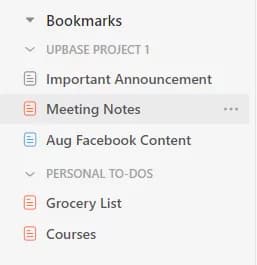
E. Tasks
As mentioned, Upbase’s task management capabilities are stronger than Evernote’s.
Tasks are managed within a list.
Here, you can create unlimited tasks and subtasks with checkboxes. Upbase’s Tasks offers almost Evernote’s paid features for free, including task assignment, due dates, and recurrence.
Additional, you can:
- Set task/subtask priorities
- Add watchers
- Attach files
- Add and edit task/subtask description
- Comments, @mention, send emojis and interact on comments
- Track task activities
- Duplicate a task
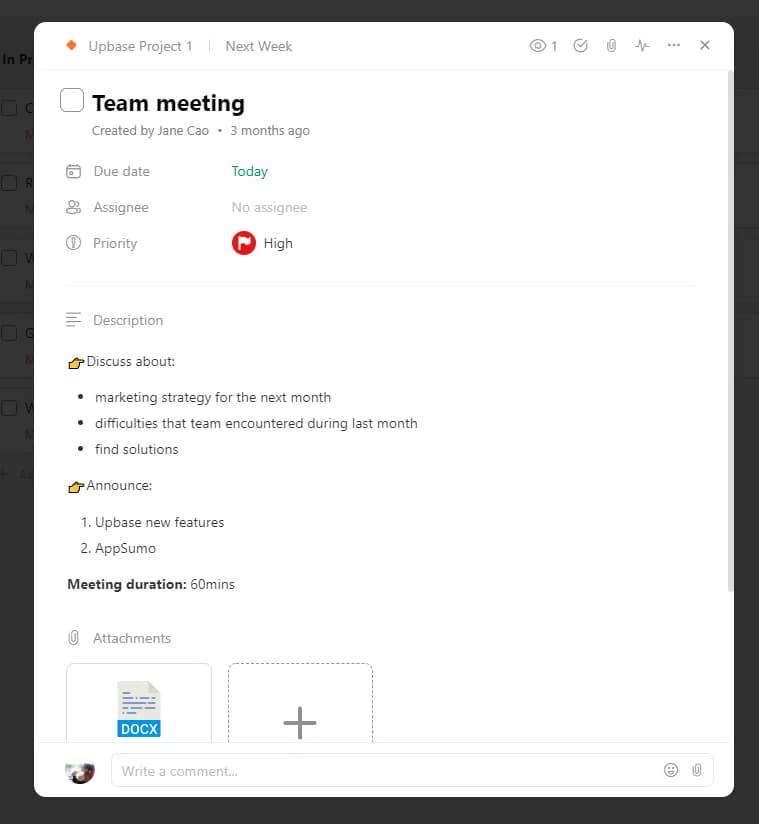
The best part?
You can set it to show task details as a popup or side panel. Show all tasks within a list in the List or Kanban Board view. And group tasks by section, due dates, priority, or assignee.
F. My Tasks
My Tasks page is particularly handy if you have multiple lists to manage.
It’s like a hub where you can see all tasks assigned to you and created by you.
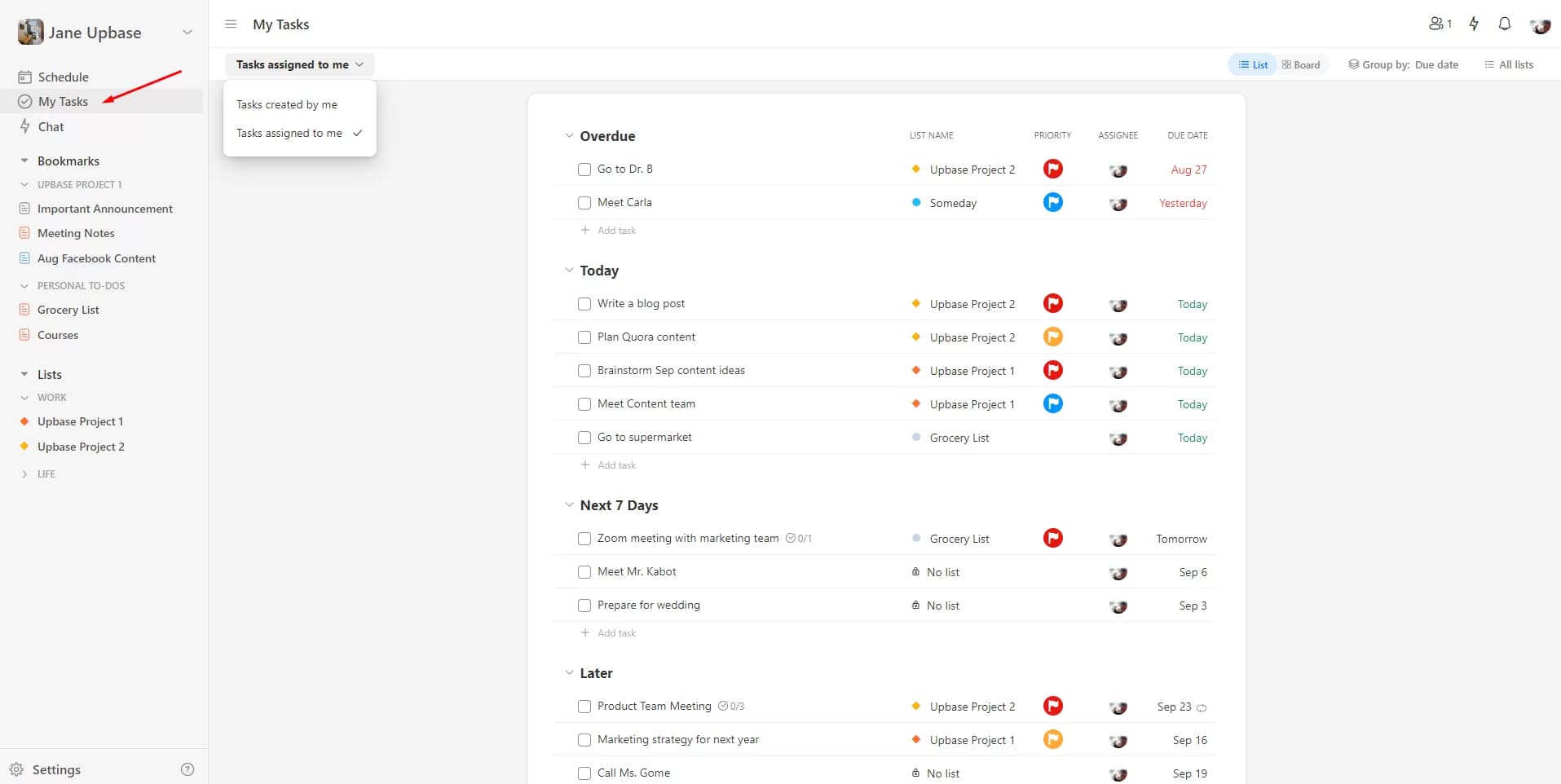
G. Schedule
Upbase’s Schedule gives you two other task views:
- Weekly Planner
- Monthly Calendar
What makes the Schedule tool special is it provides a schedule page within each list and a workspace schedule page showing scheduled tasks in all lists.
This way, you can easily plan out your work/life and track them all.
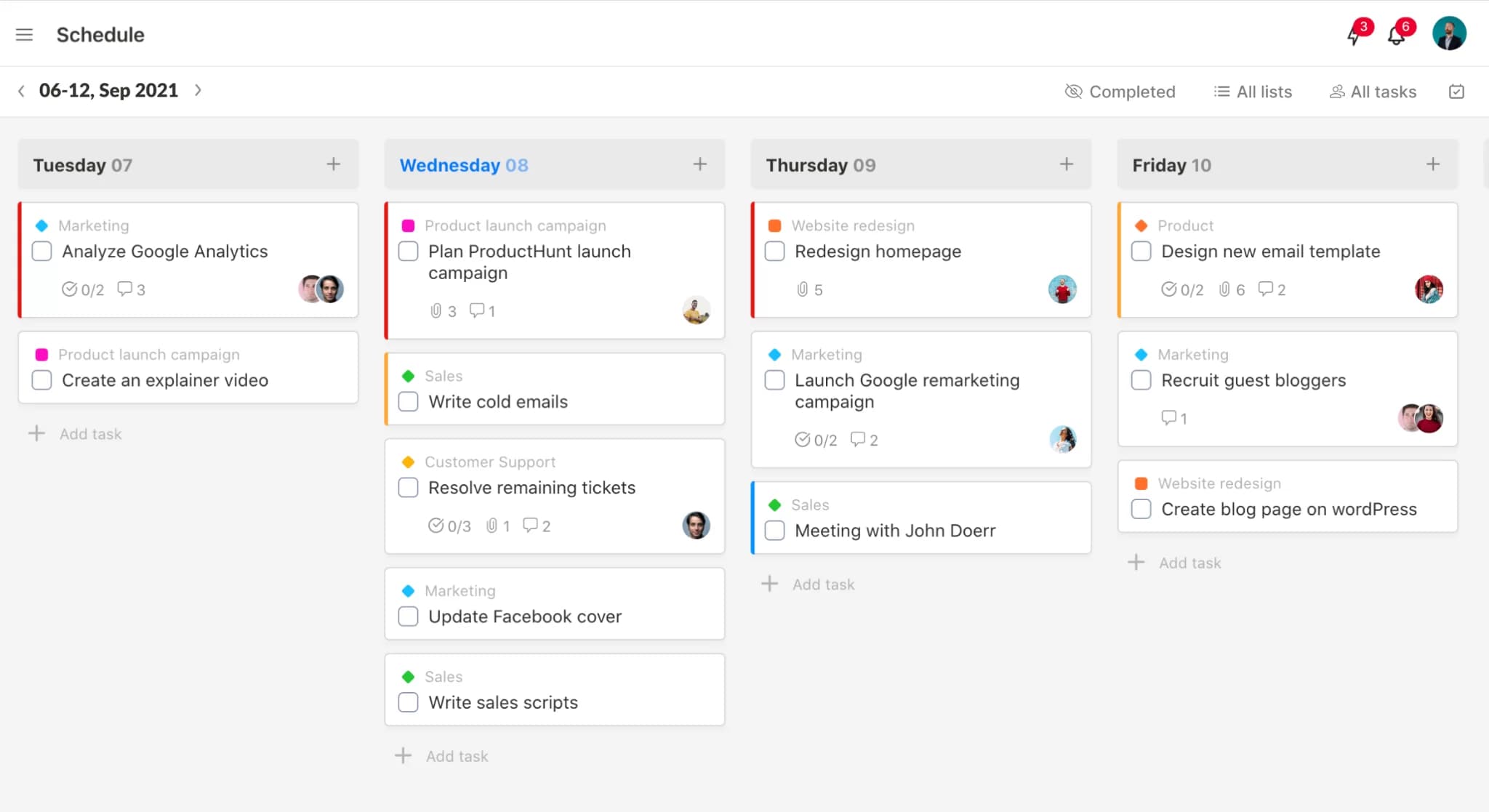
H. Other collaboration tools
Global Chat: Communicate with team members 1-on-1 or in group chat
Messages: Put all team discussions, announcements, project updates, ideas, etc. in one place. A great tool to replace long, messy email threads.
Members Page: See which tasks are assigned to whom.
Why is Upbase the best alternative to Evernote?
Upbase is a great choice for small businesses, small teams, freelancers, and solo entrepreneurs. And it defeats Evernote for these good reasons:
- Generous free plan for individuals, with unlimited tasks, members, and storage
- Simple and intuitive UI
- Organized hierarchies that keep the layout always clean and easy to navigate
- Keep all work in one place, not over the places
- Real-time chat tool for teams to communicate effectively
- A wide range of collaboration tools (Files, Team Schedule, and Messages)
- Comprehensive task management capabilities (multiple assignees, due dates, priorities, custom status, etc.)
Limitations
- No home dashboard
- No reminders
- No audio note
Pricing
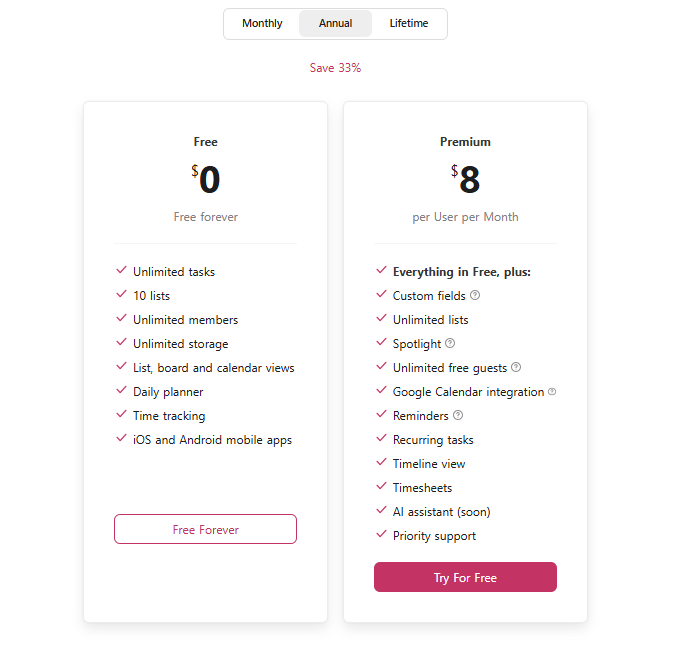
Click here for a free Upbase account.
2. Joplin
Platforms: macOS, Linux, Windows, Android and iOS.
One of the most popular Evernote alternatives is Joplin.
If you’re an old-fashioned type of user who loves to keep data in your own storage because of its privacy and no internet connection required, Joplin might help.
This open-source project management software gives you two choices of data storage:
1) Use your own servers, and all the data always stays with you. Plus, this option is 100% free
2) Spend on a monthly subscription for Joplin Cloud, and you’ve got the freedom of syncing data across all of your devices
Besides, it’s very easy to switch from Evernote to Joplin since both apps share the same structure regarding how you can organize and group notes.
But one important thing to remember is that this open-source tool doesn’t have collaboration features like Evernote.
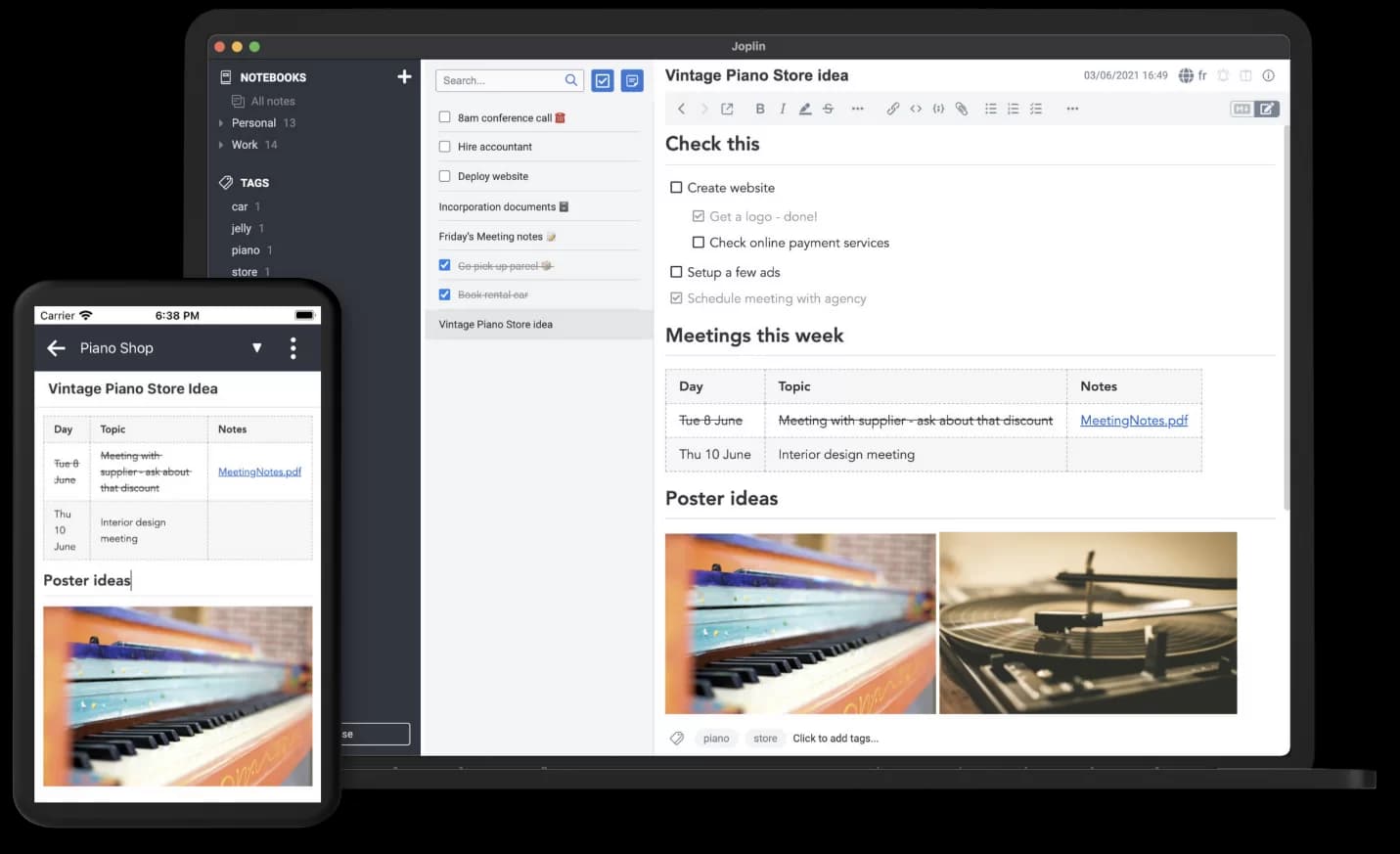
Unique Features
- Note history
- Note sharing
- Notebooks
- Tags
- Web Clipper
Pros
- Free and open source
- Ability to save web pages as notes
- Easy to share notes outside
Cons
- No collaboration
- Not support handwritten notes
Pricing

3. Hive Notes
Hive Notes brings an incredibly frictionless experience of taking meeting notes when combined with other apps in the Hive ecosystem.
Making it a powerful Evernote competitor is the ability that allows users to take notes during Zoom meetings without the hassles of switching back and forth between screens.
When you collaborate with other team members through Hive Notes, any action will be presented in their Hive ‘My Actions’ list. This ensures things don’t slip through the cracks, helping your team plan and execute projects more effectively.
Hive Notes also stands out for its Google Docs-style interface, which is easy for new users to get accustomed to.
In summary, this is a wonderful Evernote replacement for meeting notes.
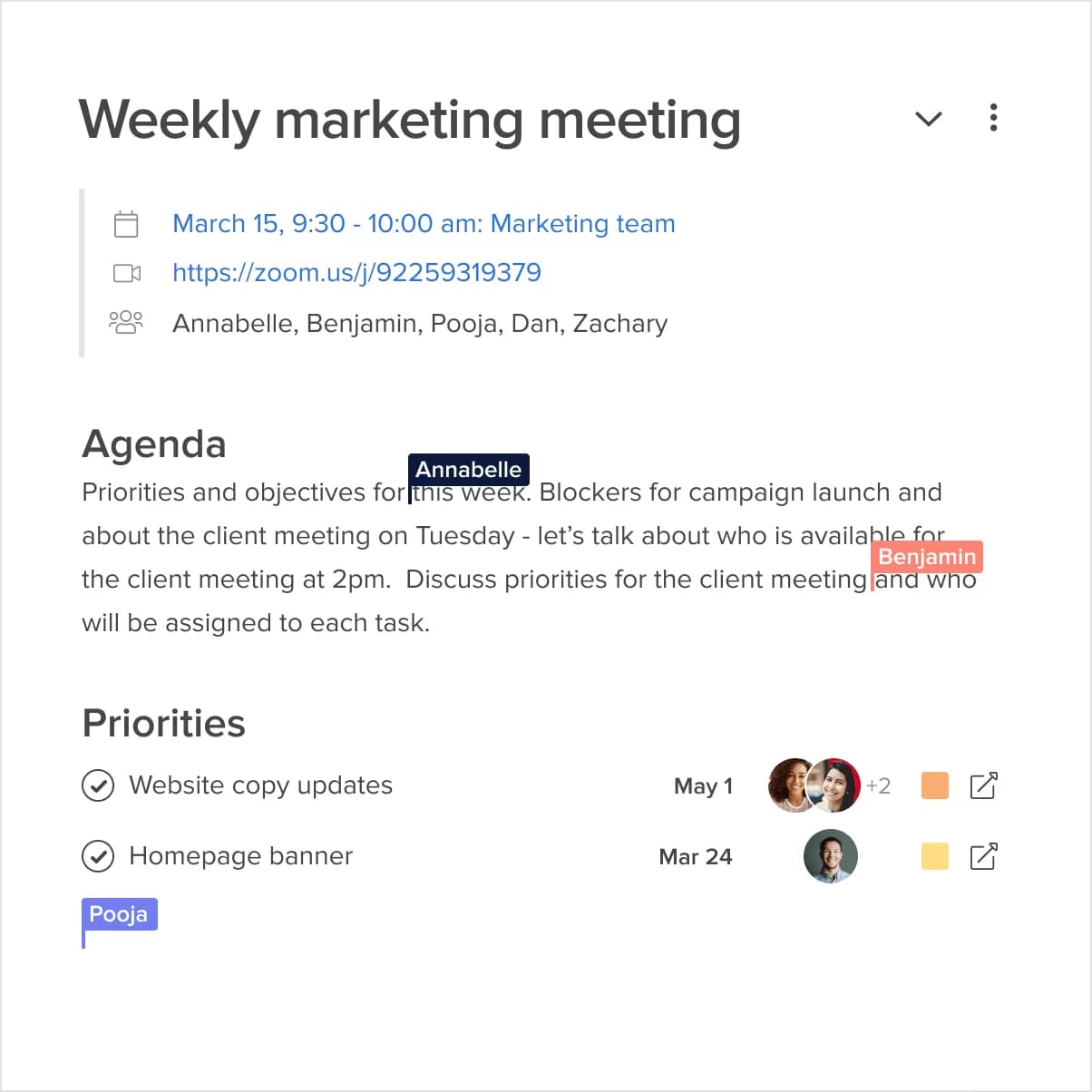
Unique Features
- Keyboard shortcuts
- Shareable notes
- Real-time collaboration tools
- Recurring meeting notes
Pros
- Ability to create recurring meeting notes & keep them in one place
- Convert meeting notes into action items
- Easy to link tasks and notes to any meeting
Cons
- The mobile app doesn’t provide as full features as the desktop one
- The search function could be more accurate
Pricing
Hive Notes offer a free forever option and two paid options: Teams option ($12 per user per month) and Enterprise option (contact sales)
4. Notion
Platforms: macOS, Windows, iOS, and Android.
We highly recommend trying Notion for those looking for an Evernote alternative that allows them to embed rich media and documents.
Notion, which can admittedly be more difficult to learn and more time-taking to set up than some picks here. But it gives you the benefit of high customization and robust collaboration features (that Evernote cannot offer).
Unlike other Evernote alternatives, Notion uses the concept of Blocks to customize workspaces.
Every piece of content – including text, tables, images, to-do lists, and calendars – is a block. And each Notion page is a stack of blocks combined however you want.
This allows you to manage notes, create documents, or manage projects, all on the same page.
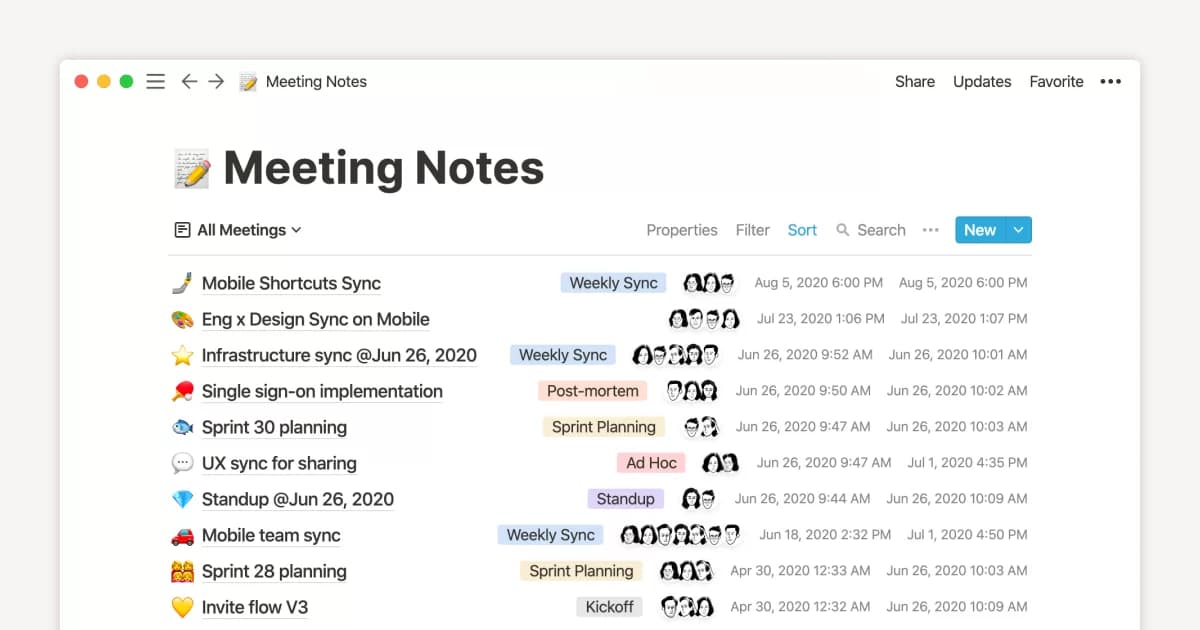
Unique Features
- Web Clipper
- Unlimited document storage
- Shared team calendar
- To-do list
- Task prioritization and scheduler
- File attachments
- Comments
Pros
- Highly customizable
- Clean and minimal user interface
- Quick to share notes
- Easy to access from anywhere
Cons
- A high learning curve
- The mobile app is slow sometimes
- Not suitable for taking quick notes
Pricing
Notion offers a free version and three paid versions:
- Personal Pro ($4 per month)
- Team ($8 per user per month)
- Enterprise (contact sales).
5. Microsoft Onenote
Platforms: Mac, Windows, Android, iOS, and Web.
Microsoft OneNote isn’t as intuitive as Evernote, but still worth checking out, especially if you use the Microsoft office suite.
OneNote is a professional note-taking app with a drag-and-drop interface.
It enables users to create unlimited notes, add images, write in, and divide them into pages and sections. You can share these notes with other OneNote users, plug in other Microsoft documents, such as MS Word or Excel, or export notes to a productivity tool.
OneNote is a great EverNote replacement where you can store video snippets, audio, images, and text notes in an organized manner.
Like Evernote, Microsoft OneNote is omnipresent on all platforms: Mac, Windows, Web, Android, and iOS.
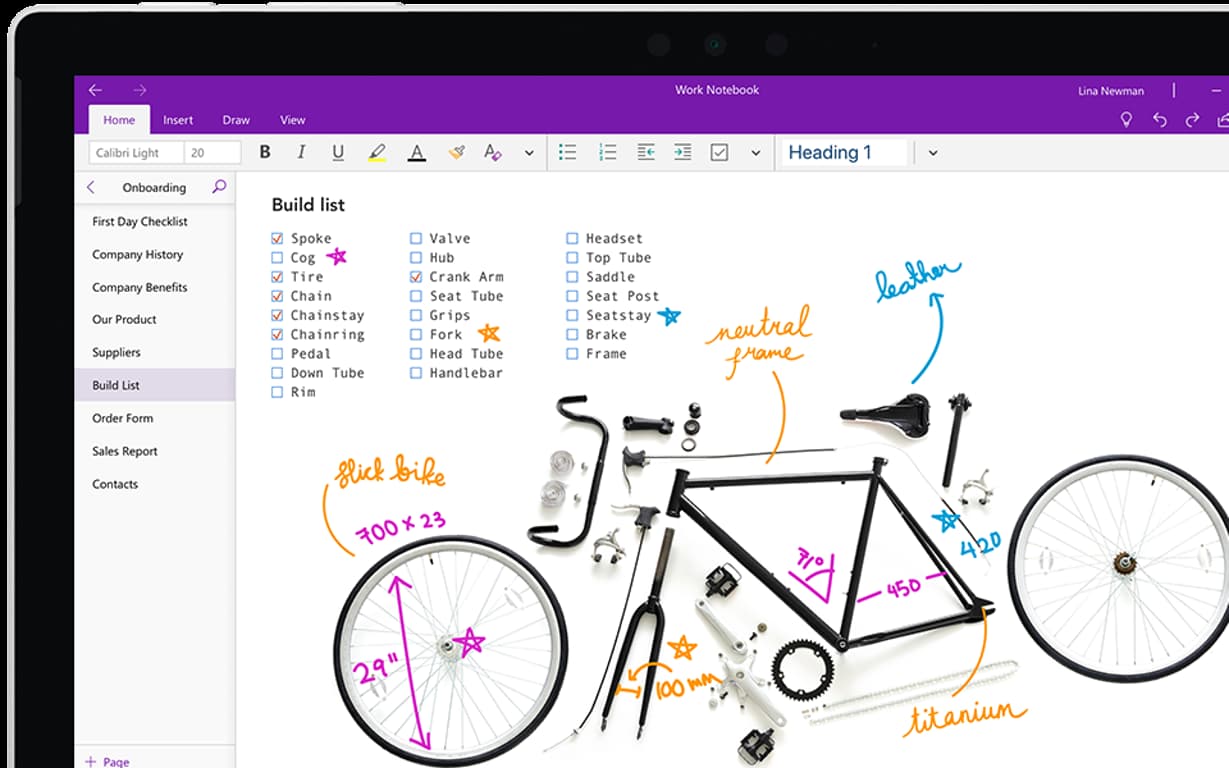
Unique Features
- Web Clipper
- Mix media
- Ink
- Important and To-Do tags
- Notebooks, sections, and pages
Pros
- Ability to insert online videos, record a voice memo, and add files
- Easy to use thanks to the drag-and-drop interface
- Never miss any important notes
- Keep your notes organized
Cons
- Microsoft OneDrive account required
- The interface of the mobile app isn’t as intuitive as the web app
- No dedicated desktop app
6. Google Keep
Platforms: Android, iOS, and Web.
For individual users who find many of Evernote’s features unnecessary for their needs and want to switch to a simpler tool, Google Keep is worth a look.
This note-taker lets users capture ideals that come to mind with a few clicks. You can add notes, audio, photos, and lists to the platform using a drag-and-drop interface. Not only that, Google Keep lets you edit and share them with contacts one at a time.
Its colorful interface is also notable. It doesn’t feel like other note-taking apps. Google Keep works seamlessly with other products in Google suite, such as Google Calendar.
Google Keep is a free app for all Google accounts.
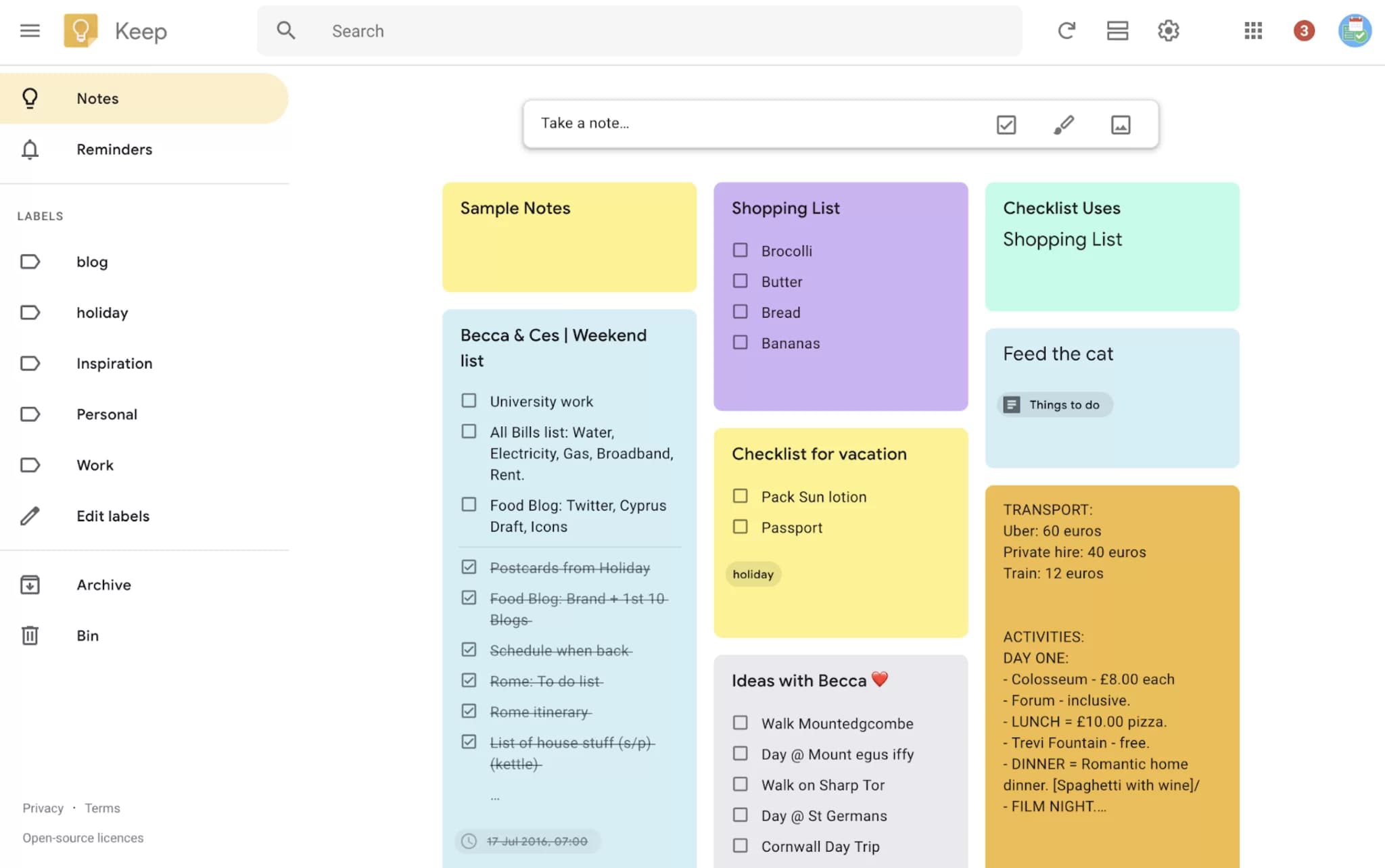
Unique Features
- Doodles
- Labels
- Search
- Nest items
- Set reminders
- Background changing
- Collaborator
Pros
- Completely free to use for all Google accounts
- Support for collaborative notes
- Offer rich text formatting
- Keep your notes organized by labels
- Easy to convert notes into Google Docs
Cons
- Poor at organizing notes
- Not effective in managing tasks
7. Zoho Notebook
Platforms: Linux, Mac OS X, iOS, Android, and Windows.
Zoho Notebook is one of the best Evernote competitors for those with a soft corner for aesthetics.
With Zoho Notebook, you can create notes quickly, organize all your notes in one central place, and save notes across multiple devices.
The tool also offers various features for you to share notes securely with friends and allows multiple users to edit on the same note simultaneously.
The slick drag-and-drop interface is a great plus.
But what impressed us the most is its collection of 30+ notebook covers hand-drawn by its in-house artists. Each note has a randomly generated background color, but you can change it to your favorite.
Another notable feature of Zoho Notebook is Note Cards, which enables users to tailor the layout of each note format – including doodles, checklists, images, audio, and text – for a pleasant experience.
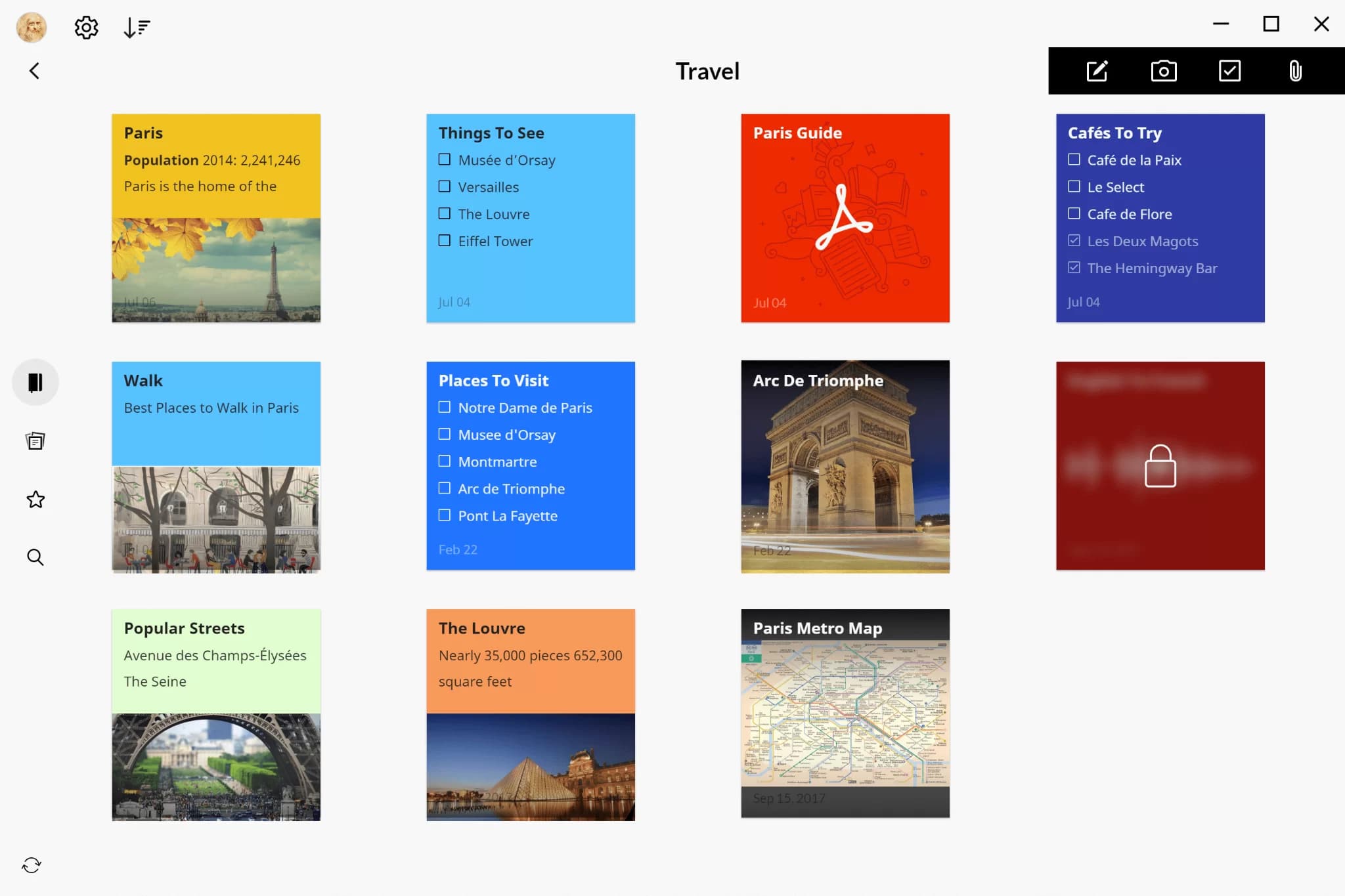
Unique Features
- Multiple note views
- Version History
- Note tags
- Collaboration tools
- Content scan
- Notebook cover
Pros
- Easy to use
- Allow you to set the permissions of external users
- Ability to create password-protect individual notes
- Support for multiple file formats
Cons
- No list view
- Unable to manage tasks
- The organization features could be better
8. ClickUp
Platforms: iOS, Android, and Web
ClickUp is a comprehensive platform where you not only can take notes but also create tasks, manage projects, make plans, collaborate, and more.
ClickUp’s highlighted features that make it a great alternative to Evernote are:
- Docs (one of the most powerful note-taking apps on the market)
- NotePad for quickly taking notes
- Tasks with add-ons like calendars, reminders, and checklists
ClickUp’s rich-featured package and endless customization options make it best suited for multi-department companies and a powerful alternative to Evernote.
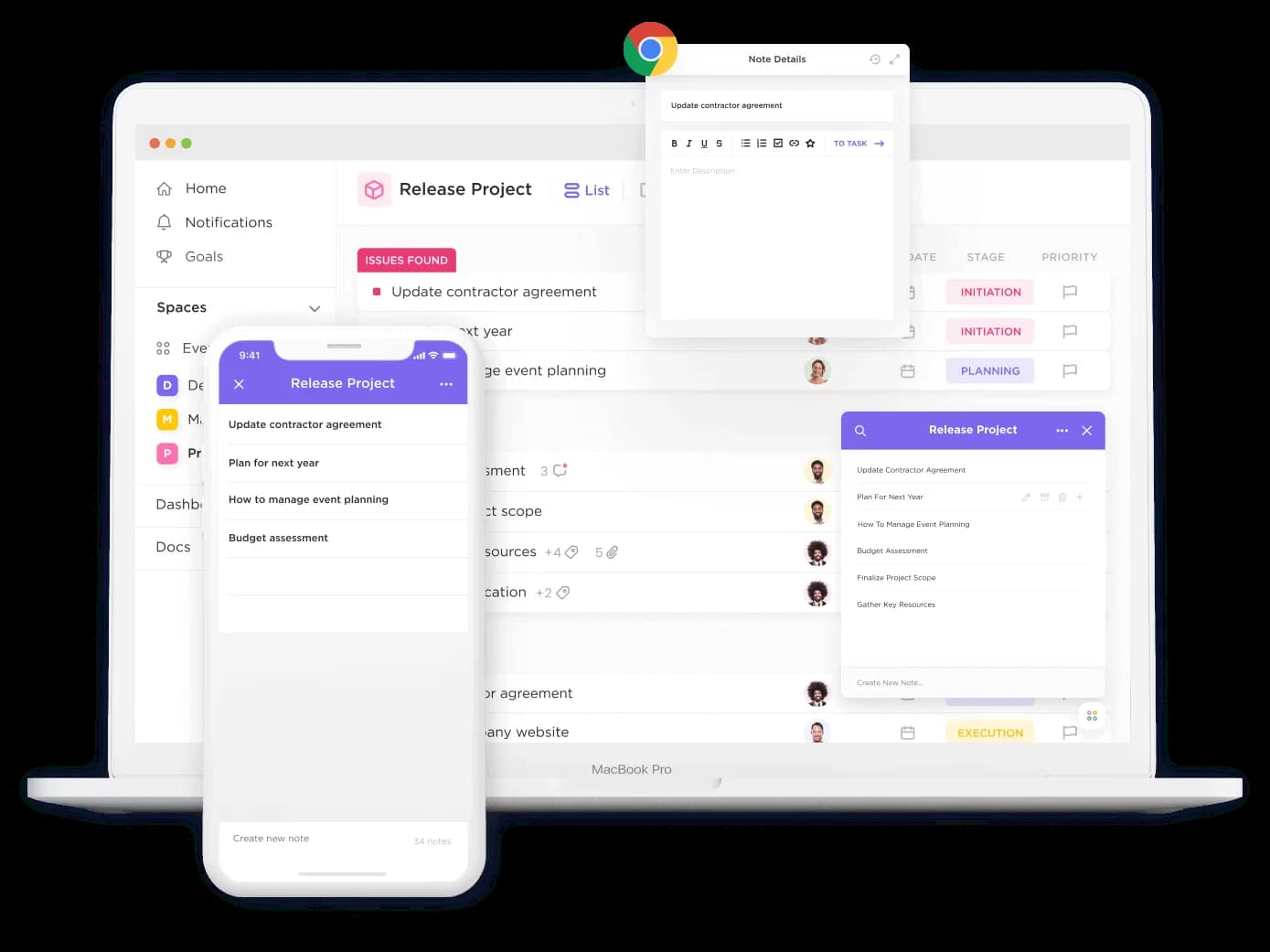
Unique Features
- Filter & search
- Reminders
- Checklists
- Docs
- Notepad
Pros
- Ability to visualize notes
- Multiplayer editing capabilities
- Support quick note-taking
Cons
- Overwhelm new users
- Crowded user interface
Pricing
ClickUp offers a free-forever plan. But if you need more advanced features, consider one of these four price plans:
+Unlimited plan (with all the basic features) starts at $5 per user per month
+Business plan starts at $12 per user per month
+Business Plus plan starts at $19 per user per month
+Enterprise plan – contact sales.
9. Bear Notes
Platforms: Mac and iOS.
Bear’s simplicity, flexibility, and speedy interface make it one of the top Evernote alternatives, especially if you’re an Apple user.
If you are a long-time Evernote user, you’ll immediately recognize a big difference in the load time when switching to Bear.
This is especially true on mobile. The icons of the Bear app are intuitive, and the slide-and-swipe gestures to pin, sort, and delete notes bring a pleasant experience.
Two other notable Bear features are the ability to link between notes and the Slack-like hashtag system to organize notes, enabling users to save one note across multiple relevant hashtags.
However, if all your devices use the Windows or Android operating system, move on.
Bear Notes are only available on mac computers and iOS devices.
And even though Bear has a web app, it uses iCloud to sync the users’ data. So again, if you’re not a user of the Bitten Apple, hold off switching to this note-taking application for now.
Unique Features
- Focus Mode
- Hashtags
- Cross-Note Links
- Advanced Markup Editor
Pros
- Offer rich text formatting on the mobile app
- Organize and quickly find notes when in need
- Ability to build a body of work
Cons
- No Android app or Windows app
- No notifications
Pricing
Bear Notes offer no forever-free plan, but two subscription options: One that charges $1.48 per month with a 7-day free trial and one that charges $14.99 per year with a 30-day free trial.
10. Simple Note
Platforms: Web, iOS, Android, Windows, Mac, and Linux.
Like Google Keep, SimpleNote doesn’t pack as many features as Evernote. This is just a cross-platform notebook with automatic syncing. And it only supports text notes, meaning you can’t record audio or add images.
In turn, SimpleNote is incredibly speedy, lightweight, and 100% forever-free on as many devices as you like. There are apps for Android, iOS, Windows, Linux, Kindle Fire, and Mac, plus a web version. SimpleNote also offers unlimited storage.
When it comes to functionality, SimpleNote – although considered a basic note-taking tool – still offers collaboration options, revision history, tags, and Markdown. Enough for people with modest note-taking needs.
Broadly, SimpleNote is a good Evernote replacement for those firmly in the less-is-more camp.
Unique Features
- Tags
- Note history
- Checklists
- Audio note
Pros
- No cost
- Enable you to take notes by speaking it
- Allow users to see previous versions of the note
Cons
- Prone to cluttering
- No formatting tools
Pricing
$10 per user per year (US)
11. Dropbox Paper
Platforms: Web, Mac, Android, iOS, Windows, and Linux.
Despite being a newcomer in the note-taking tool field and still undergoing stability testing, Dropbox Paper is arguably a robust Evernote competitor.
Dropbox Paper is a more serious business tool than Google Keep and doesn’t require much of your effort to set up like Notion. It’s very easy to transform simple notes into big ideas, share ideas, and search for notes in Dropbox Paper.
Still, Dropbox Paper has a set of minor drawbacks. Such as, users cannot add docs directly to the app, the confusing user interface, and lacking features for managing tasks.
Unique Features
- To-do list
- Folders
- Text and image search
- Keyboard shortcuts
Pros
- Free desktop and mobile apps
- Support project planning
- Help you navigate the tool quickly and easily
Cons
- Confusing UI
- Not effective to manage tasks
12. ProofHub
Platforms: Android, iOS, and the web.
As an all-in-one project management platform, ProofHub helps gather notes, thoughts, and ideas in one place.
Not just being a great note-taking tool but ProofHub also supports task management, project planning, and team collaboration.
But what makes ProofHub special is its pricing. Unlike many other Evernote alternatives, ProofHub offers flat-price options which are ideal for large teams and enterprises.
Unique Features
- Quick Add
- Bookmarks
- Keyboard shortcuts
- Notes
- Announcements
- Discussions
- Files & Docs
Pros
- A comprehensive project management program
- Flexible in managing tasks
- Easy to share files
Cons
- Clunky user interface
- A steep learning curve
Read more: Best ProofHub alternatives for 2025.
Pricing
Two flat price options: Essential – $45 per month and Ultimate Control – $89 per month. Each comes with a free trial for 30 days and offers unlimited users.
13. Notejoy
Platforms: Windows, Mac, Android, iOS, and the web.
Regarding collaborative note-taking experience, Notejoy is the best Evernote alternative.
One of Notejoy’s highlighted features is its speedy and powerful search bar. Thanks to it, you can find the desired notes at lightning speed without much effort.
For all its strengths, Notejoy has some fundamental weaknesses. The first is that there’s no automation feature, so you’ll have to do everything manually in this app. Secondly, Notejoy’s features for managing tasks are not the best.
Key Features
- Checklists
- Nested notebooks and tags
- Powerful search
- Keyboard shortcuts
Pros
- Capture thoughts and ideas fast
- Ability to search for everything frictionless
- Keep notes organized and searchable
Cons
- Limited task or project management capabilities
- No automation
Pricing
Available a free plan.
Three paid plans:
- Solo plan – starting at $4 per month, billed annually
- Plus plan – starting at $8 per user per month, billed annually
- Premium plan – starting at $12 per user per month, billed annually
14. Apple Notes
Platforms: Web, iOS, and Mac.
Like Bear, Apple Notes are specifically designed for Mac computers and Apple devices.
Over the years, Apple Notes has constantly changed and updated. So much so that many users feel like they don’t need any third-party app for note-taking at all.
Apple Notes shines the most at the ability to set private notes using a password, face ID, or touch ID. It also enables you to recover and edit iCloud notes, and add locations and websites to a note.
Key Features
- Folders
- Tags
- Pin
- Dark Mode
- Attachments
Pros
- Easy to use
- Ability to pin your favorite notes
- View notes in the gallery view
Cons
- Just manage simple tasks
- Not for Android users
15. Wrike
Platforms: iOS and Android.
Wrike is better than Evernote in team collaboration due to its fully customizable team sprint dashboards.
Wrike is considered the best Evernote alternative for marketing teams or agencies. The reason is it gives everyone an overview of all the project phases to make quick decisions and carry out their strategy effectively.
This Evernote alternative also offers many powerful project management features.
Key Features
- To-do lists
- Kanban boards
- Gantt charts
- Customizable dashboards
Pros
- Ease of visibility across teams
- Enable good online collaboration
- Ability to manage, plan, and assign tasks
Cons
- Confusing user interface
- Limited mobile app
Pricing
Wrike offers a free-forever plan and the paid plans start at $9.8 per user per month.
Which Note-Taking App Out There Is The Right Evernote Alternative For You?
No Evernote alternative is going to be the best choice for every individual.
Different people have different needs, preferences, technical experiences, and budgets. And we round up this list with that in mind.
Instead of making the definitive statement about the best Evernote alternative, we give you options and point out the strength and weaknesses of each, plus its pricing, to help you pick the best yourself.
But if you love to hear from us, then our suggestion is Upbase.
Upbase particularly shines as a tool for freelancers, small teams, and solo entrepreneurs. Those who want a tool with more powerful task management capabilities, more collaboration tools, and more intuitive nature.
What makes Upbase stand out is its unique balance between functionality and simplicity, so even users with no technical experience can start easily.
Upbase has a forever-free plan with unlimited storage capability. And the registration takes you no longer than 2 minutes. No credit cards are required.
So, if you’re curious how Upbase could fit your needs, sign up and try now.
Read more: 17 Best Todoist Alternatives For Task Project Management in 2025
